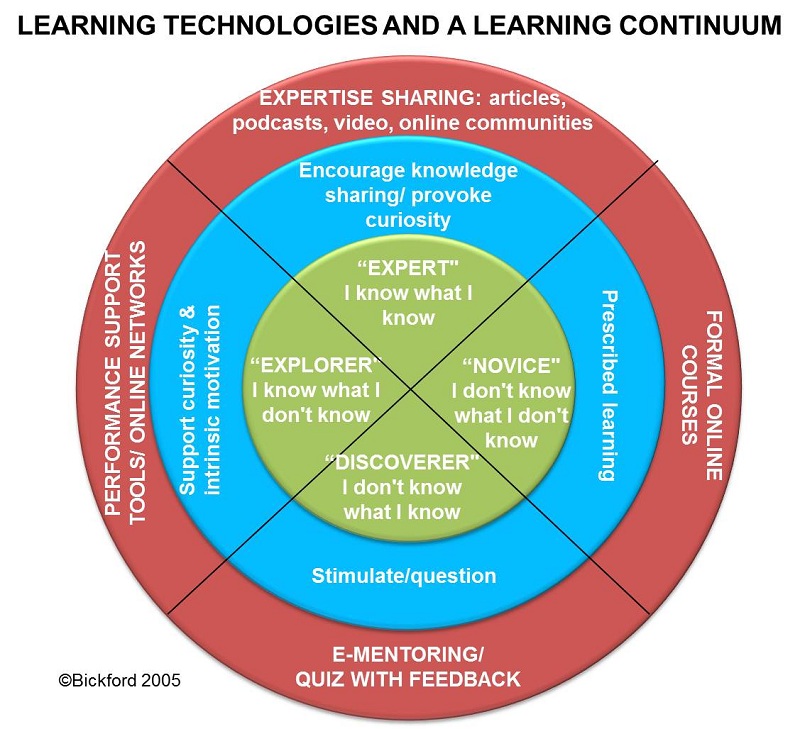Question from a client: Our staff need to be agile in knowledge and skill development to thrive in an environment of ever faster change. What are the technology options for different states in skill and knowledge?
This comment reminded me of my 2005 Learning Technologies and a Learning Continuum which illustrates the application of learning technology (e-learning) based upon staff skill level at a point in time. For each ‘state’ of the learning continuum there is a technology option that is ‘fit for purpose’.
Novice: Prescribed learning – This is the opportunity to develop foundation knowledge or skills. Of course, foundation knowledge or skills should always be couched in learner’s context so that they can understand how the information relates to them. Prescribed learning is not about ‘content dump’. It’s about providing an instructional approach that enables new knowledge and skills to be readily assimilated. It’s about providing the building blocks from which staff can begin to develop judgement and problem-solving skills.
Discoverer: Stimulate & Question – When staff are relatively new to skills or knowledge, they often need to be both reminded of the new skill, and be assured of what they have retained. Guidance through mentoring or self-assessment can help reaffirm to a learner what they know, and make obvious the gaps in skills that require attention.
Explorer: Support curiosity & intrinsic motivation – A sure way to dampen motivation is when we do a poor job providing the tools and support to enable staff to apply their new skills and knowledge into the workplace, through on-demand tools and/or access to experts. Such options help staff feel supported as they begin to develop skills in judgement and problem-solving associated with the ambiguous nature of the workplace (i.e. few workplace situations are ‘cut and dry’). Or, for times when the learnt skills haven’t been used for a while and staff need a refresher before actioning the skill.
Expert: Encourage knowledge sharing and provoke curiosity – Experts are so often an untapped resource for organisations. And, when they are used to help up skill others, the process is often labour-intensive and unsystemised. Leveraging expert knowledge and skills by recording and disseminating contextual ‘pearls of wisdom’, or by leveraging experts in networks and mentoring programs not only supports organisational knowledge management strategies, but provides experts with additional purpose to their role. Remember, when people of different experiences ‘collide'(e.g. through networks), there is a chance for new ideas and innovation to be generated.
My continuum suggests that, depending upon the learner ‘state’ (whether developing or leveraging staff knowledge and skills), there is a learning strategy that makes better sense. Try using this continuum to examine and get clear about the purpose for your learning intervention. Then, look at the technology (e-learning) options that will support the learning design for that purpose.
For information on video for organisational learning such as performance support and leveraging experts, have a look at my new video series on YouTube Video for Organisational Learning.


Alison, I like your differentiation between different types of learners, it’s something certainly we need to do. It’s also true that novices definitely need more formal training than others on your circle, But, I wouldn’t exclude them from the value that comes from the other activities. Perhaps the outer rim of your circle is more a key option than an exclusive one?
Hi Ara
Thank you for your comment. Yes, you are quite correct that the model shouldn’t be seen as ‘absolute’ and without leaky margins. It is also true that an individual can be a novice in one area of the capability required to do their role, and an expert in another area of role capability.
Thanks again for your contribution, Alison